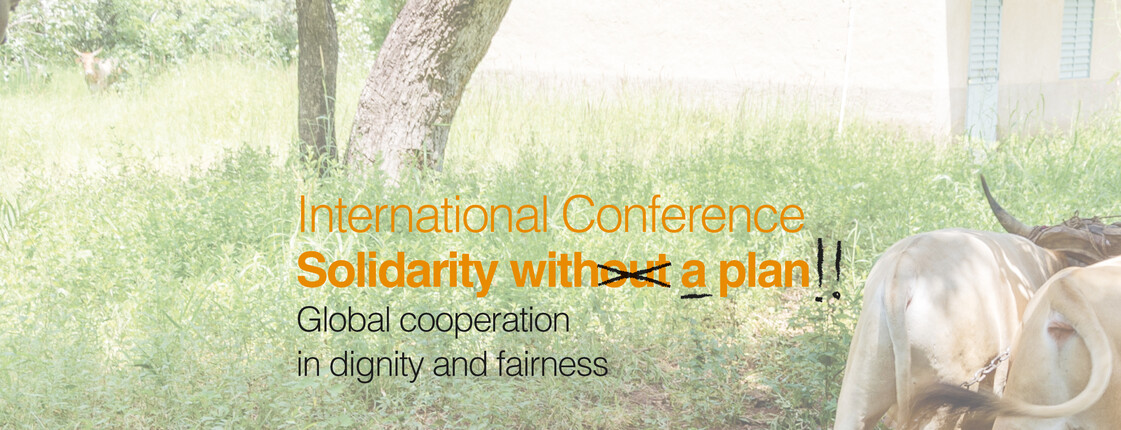
Keynotes
Keynote I: Laudato si
Is the environmental encyclical Laudato Si an incitement to save the world?
Dr. Marianne Heimbach-Steins
Poverty, inequality and the destruction of nature continue, are deepened - the life chances of future generations are endangered. The encyclical speaks of a common but different responsibility to be carried, as the various states have a different use of resources and CO2 production.
Diet and hunger are deliberately considered in the context of poverty and the destruction of the environment. The encyclical looks at land use and animal husbandry from a systemic and spiritual perspective and emphasizes the farmers' attachment to land and their living environment.
Keynote II: SDG's
"We live on a third world planet."
Dr. Adil Najam
Solidarity, justice and a life in dignity look different. Adil Najam is a professor at the School of Global Studies at the University of Boston. Najam sees the world as a whole, and it is in a wretched state. We can't stop climate change, it's already there. Climate protection is important, but far away from being sufficient. We have already reached the age of adaptation, which means that we should do our utmost to prepare ourselves against the effects of climate change. The Sustainable Development Goals can help us to achieve this.
As an interdisciplinary and global guideline, the SDGs also foresee the involvement of the industrialized countries. They can be seen as a master plan for global solidarity, justice and a life in dignity. However, there is a catch: SDGs have also to be implemented.
Keynote III: Food security
Are small and micro scale farmers the backbone of food security?
Dr. Michael Hauser
If we want to achieve the zero-hunger targets by 2030, we must change our perception about agriculture, especially the way we think about smallholder farmers in the Global South. Rather than victimizing farmers amidst climate change, soil degradation and starvation, we must see them as allies in progressing food justice and rights-based development within planetary boundaries. Farming, if done right, can transform the way we produce, exchange and use food, and eventually help to build sustainable food systems. Besides political will, ingredients of such food system transformation are social innovation, digitalization and big data. More importantly, development programs must rethink its support to smallholder farmers in future. Without doubt, we need radically new collaborative arrangements in farming to achieve the zero-hunger targets—and eventually drive social change at scale.
Keynote IV: Education and future
Often requested, never achieved: education for everyone!
Dr. Margarita Langthaler
387 million children worldwide live in extreme poverty. 124 million children do not go to school. The UN Convention on the Rights of the Child was founded 30 years ago, which, among other things, grants all children the right to education and the right to protection and security. Although almost all countries worldwide signed the Convention on the Rights of the Child, many children around the world are still excluded from essential rights.
For many children as well as adults, education is not a general right, but a competitive and hard-to-reach good, a commodity which they cannot afford. This does not only make their chances for a better life more difficult. The countries in which they live also waste opportunities to create societies through a general access to education, in which economic development can be shaped sustainably and distributed in a socially fair way.
Why has education for everyone - a very old development goal - not yet been achieved? Why is it so difficult to achieve this goal? Is it due to corrupt governments and inefficient educational strategies? Or are the causes deeper? And what does it take to ensure that education can really benefit everyone and contribute to the socio-ecological transformation as set out in the 2030 Agenda and the Sustainable Development Goals?
Keynote V: Humanitarian aid
Challenges of HUHI in protracted and hidden crises!
Dr. Rita Rhayem
Nine out of ten disasters are considered "silent catastrophes". Long-lasting crises lose their media attention and aid the longer they last. One of many consequences of this is the fact that, currently, there are 70 million people seeking refuge. Does the principle remain "leave no one behind" which was then a pious hope, or is there another plan?
Complex and protracted crises, mixed with violent conflicts, present a particular challenge regarding humanitarian aid. It is not only the connected difficult security situation that hinders its use in the spirit of humanity. In most cases, financial resources are missing. Media attention and the interest of politically important people are prerequisites for humanitarian aid.
Continuing conflicts and the search for security and better living conditions are causing more and more people to leave their homes. Currently, more than 70 million people are on the run, half of them are children. This issue of refuge and migration has dominated the political and public discourse in Europe for several years. This discourse and the developed strategies change the perception and expectations of humanitarian aid and development cooperation.

22. - 24.04.2019
Bildungshaus St. Hippolyt
Eybnerstraße 6, 3100 St. Pölten